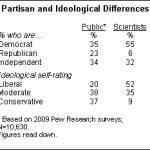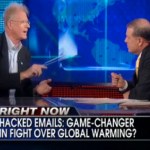
A recent article at the journal Science Communication reports on an innovative EU program that trained scientists in public engagement and science-society relations. Along with the Leopold Leadership Program, it is perhaps the best initiative to be developed to date and should be part of the blueprint for state-of-the-art training programs in the United States.
One of the program coordinators and authors of the article is Declan Fahy, who will be joining our faculty in the School of Communication at American University later this year. An experienced newspaper journalist, Fahy is…
CORRECTION: The Indicators Report will be released Friday, Jan. 15.
The bi-annual NSF Science Indicators report will be released on Wednesday. Chapter 7 of the report will contain a useful synthesis of public opinion trends on science-related topics along with review of research on other dimensions of the science-society relationship. Check back here later this week for discussion of the implications of the report.
Last month, I did an interview with the Philadelphia City Paper on the stolen CRU emails. The feature story provides useful background and context on the communication dynamics of the event. Yet in organizing these details and assembling quotes, the reporter applies a now dominant narrative that the controversy is the latest sign of the growing strength of the climate skeptic movement, a movement fueled by the "anti-science" hostility of American society.
The moral lesson of this narrative, told by liberal commentators and reflected at mainstream outlets and various science media, argues…
The American University news media relations office is running a Web feature that focuses on many of the themes discussed at this blog. The feature is in the form of a "Q&A." You can read the feature here. Below are the questions for which I responded with written answers.
Q: What is "framing" and why is it important?
Q: What, in your opinion, is the most pressing scientific issue in need of being reframed in the United States, and why does it need to be reframed (what about the communication of this issue has not worked to win over broader public support)?
Q: How would you reframe…
Slides and synchronized video of the presentations from the AGU panel "Re-Starting the Conversation on Climate Change: The Media, Dialogue, and Public Engagement Workshop" are now online. Below I link to each of the presentations highlighting key themes or conclusions and the minute mark in the video.
Mass Media and the Cultural Politics of Climate Change
Max Boykoff, Ph.D.
University of Colorado-Boulder
Mass media serve vital roles in the communication processes between science, policy-makers and the public. This presentation reviews contextual factors as well as journalistic pressures…
Overlooked in the coverage and discussion of Copenhagen are the remarks of Calif. Gov. Arnold Schwarzenegger who in his speech at the summit emphasized that the real future of policy innovation and action rests at the local level. Watch in the clip above as Schwarzenegger calls for a follow-up summit of cities, states, provinces, and regional/municipal governments on climate change, volunteering the state of California as the host.
Of course, if cities and regions are going to be the engines for change and innovation on climate policy, they need the communication infrastructure to fuel…
Roughly 90 scientists, journalists, educators, PIOs, and policy staffers turned out to Sunday afternoon's AGU workshop on climate change communication. I will have more to say about the panel in forthcoming posts, but for now, Steve Easterbrook provides an amazingly thorough, transcript-like overview of the panel and session. Slides and video of the presentations will eventually be posted at the AGU site.
From the Associated Press to the Guardian to Reuters to Agence France Presse,protesters and journalists create a confusing storyline focused on chaos, conflict, and law and order
It's too early to say what impact the protests in Copenhagen will have on the negotiating process or on world public opinion. However, when it comes to social protest generally, past research suggests several common and powerful barriers to communication success. There are a few rare exceptions, such as the Civil Rights marches of the 1960s, but on issues such as world trade, food biotechnology, or the war in Iraq…
One of the arguments I have been making in talking to journalists is to beware the hype over the relative impact of the climate skeptics movement in contributing to societal inaction on climate change. As many studies, articles, and experts have documented and described, the impact of the skeptic movement is only one of several significant contributors to political gridlock and perceptual differences on climate change.
In a recent blog post on Copenhagen, Michael Shellenberger and Ted Nordhaus adeptly argue this point. I don't agree with all of their post and I don't share the same…
Audio of yesterday's discussion at WAMU's Kojo Nnamdi Show on science, religion, and the climate debate is now available online. I wish we had more time to focus in depth on several of the themes raised in the program. In particular I think there is much more to explore relative to my concluding comments on how scientists and environmentalists need to find more communication partners on climate change, ranging from religious leaders and public health professionals to national security experts and business CEOs.
Tomorrow at 130pm, I will be a guest on WAMU's Kojo Nnamdi Show to discuss the communication challenge on climate change and strategies for overcoming political polarization.
Also as guests from Copenhagen will be Richard Cizik, formerly VP of the National Association of Evangelicals and Eric Chivian, director of the Center for Health and the Global Environment at Harvard University. In 2008, Cizik and Chivian were named among Time magazine's 100 most influential people.
Earlier this year in a paper published at the journal Environment, I discussed the efforts by Cizik and Chivian in…
On Copenhagen, not surprisingly, ideologically driven media outlets are working overtime to brand themselves and appeal to their respective audiences. Not only do we have the expected conservative commentary and reporting from brands such as Fox News and National Review archived daily at hubs such as the Drudge Report but there is also an initiative called the Copenhagen News Collaborative that brands together in one place commentary and reporting from reliably liberal news organizations and blogs such as Mother Jones, Huffington Post, TreeHugger.com, and Grist.
Conservative and liberal…
Over at the Columbia Journalism Review, Curtis Brainard and Cristine Russell file their first overview and analysis of Copenhagen coverage. Their daily round up of mostly mainstream news reporting promises to be a must read for the coming weeks.
ClimateGate: A now ubiquitous tagline that conveys a preferred storyline.
In a paper published earlier this year at the journal Environment, I explained how claims and arguments relative to the climate change debate can be classified and tracked using a typology of frames that are common to science-related issues.
With the recent controversy over the East Anglia stolen emails, one of these common frames has come to dominate discussion leading up to Copenhagen. What's different this time around is that climate skeptics and conservatives are applying the frame, rather than liberals and…
The journal Environmental Health Perspectives leads off its December issue with a news feature on the relevance of framing research to science communication. For readers who have followed recent review articles at Nature Biotechnology and the American Journal of Botany, the news feature adds additional insights.
EHP is a monthly journal of peer-reviewed research and news on the impact of the environment on human health. EHP is published by the National Institute of Environmental Health Sciences and its content is free online.
A week from today, at their annual meetings in San Francisco, the American Geophysical Union will be sponsoring a workshop I co-organized on research related to climate change communication and public engagement. In the context of debates over Copenhagen and the stolen climate change emails, the session is particularly timely and relevant. Details are below and advance registration is at this page. So far, roughly 100 attendees have registered.
Re-Starting the Conversation on Climate Change:
The Media, Dialogue, and Public Engagement Workshop
Sunday, 13 December (1:00 PM -5:00 PM)
Inter…
If you are trying to make sense of the surge of news coverage and commentary surrounding the stolen e-mails from the East Anglia University Climatic Research Center, the place to start is Curtis Brainard's outstanding overview and critique of coverage last week at the Columbia Journalism Review.
I've been busy the past week with wrapping up the semester. As a consequence, I have not had the chance to post about continuing developments related to the stolen emails from servers at University of East Anglia's Climatic Research Unit (CRU).
However, today is a convenient time to weigh in, since I share many of the same conclusions offered by Mike Hulme in recent op-eds at the BBC and Wall Street Journal.
Before discussing the Hulme articles, let me relay a few observations. Since the stolen email story broke, my concern has been that many bloggers and commentators are overlooking the…
Richard Kerr's recent news feature at Science magazine offers a compelling look at the many communication challenges on climate change, especially at a time of apparent "climate fatigue." As Roger Pielke comments in the Science article, by sounding the alarm on climate change too loudly, campaigners may be causing important segments of the audience to tune out their message.
In a separate article at Yale Environment 360, Ted Nordhaus and Michael Schellenberger offer a similar argument to those I have made in the past, most recently in a paper at the journal Environment. Here's how…
For DC readers, NOAA administrator Jane Lubchenco will be speaking at American University tonight. Details are below
In 1998, Lubchenco as president of AAAS argued for a new social contract for science that requires scientists and their organizations to "communicate their knowledge and understanding widely in order to inform decisions of individuals and institutions." Her commitment to "civic science" led her to found the Aldo Leopold Leadership Fellows program, which over the past decade has trained up to 20 mid-career scientists per year in public affairs and communication. For…




